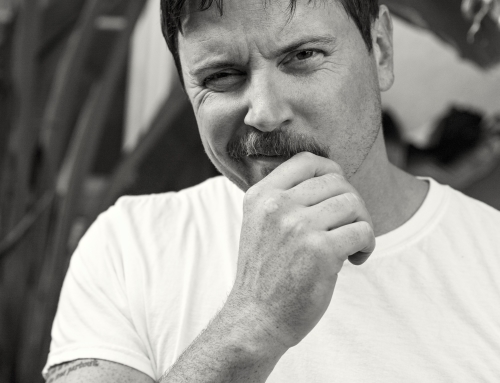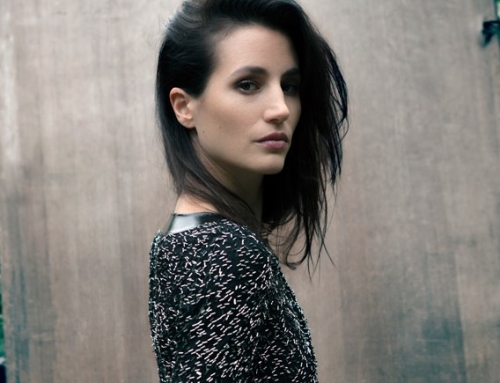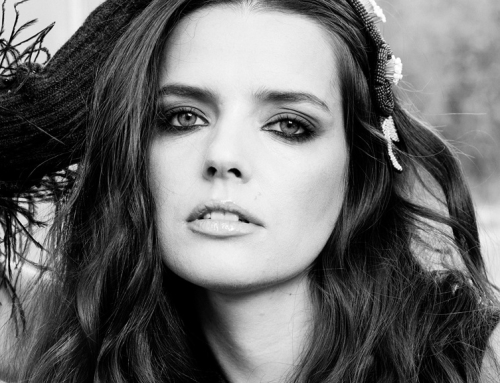In Soprano‘s creator David Chase’s debut film, Not Fade Away, music is a golden compass, held tightly in hand by the plot.
At the centre of the film’s crescendo is Douglas Damiano played by rising star, John Magaro. Cast in the role of the story’s lost soul, his character — a young aspiring New Jersey musician — finds his path unfurled before the wide world when serendipity steps in, and leaves his band’s lead singer Gene injured (from swallowing a lit joint), thereby rendering Douglas — the drummer — his stand in. Life shines brighter — though with fluctuating luminosity — as Magaro’s character discovers the virtues of talent, and its pretty benefits. And, the prettiest of them all: Grace, his sweetheart with starling tendencies played by Dark Shadow‘s promising young Australian-import, Bella Heathcote.
Coming into his own under the spotlight, Douglas’s free-spirited journey of discovery inserts tension into his home life. A contrast in appearance and ideology to his blue collar Italian American family, the Damiano’s dining room table plays out the changing social dynamics that penetrated the 60s, brilliantly flushed out in the relationship between son and family matriarch Pat (James Gandolfini).
Soprano fans will undoubtedly spot a glimmer of their beloved Tony in the tempestuous Pat character. Strong-minded, he is yet still a man entrenched in the duties tradition has demanded of him. And, by living so, he has forgone the opportunity to realize his own sense of individuality. Observing his son pursue his dreams, Gandolfini’s Pat feels a a sting of regret, despite his display of disapproval.
A film that embraces its era, Not Fade Away embodies the dichotomy of the 60s. Changes in society and politics — all mirrored in the music of the day — became the wedge between The Greatest Generation of WWII and their children, something Chase, a Baby Boomer himself recalls with provoking authenticity in the film, aided by a soundtrack of the times.
The Zeitgiest is alive and kicking in Not Fade Away‘s must-have soundtrack created by Steven Van Zandt, music supervisor, executive producer and former Soprano’s star (Silvio Dante), who also fittingly happens to be an Springsteen E Street Band mainstay. A key component of this coming-of-age drama, music is Douglas’ gateway into an alternative universe outside the parameters of his childhood home. As the actor explains, “When you grow up outside of a cosmopolitan area, and your folks aren’t artists, your first introduction to what art can be tends to come from the music you listen to, the films you watch, and the television you follow.”
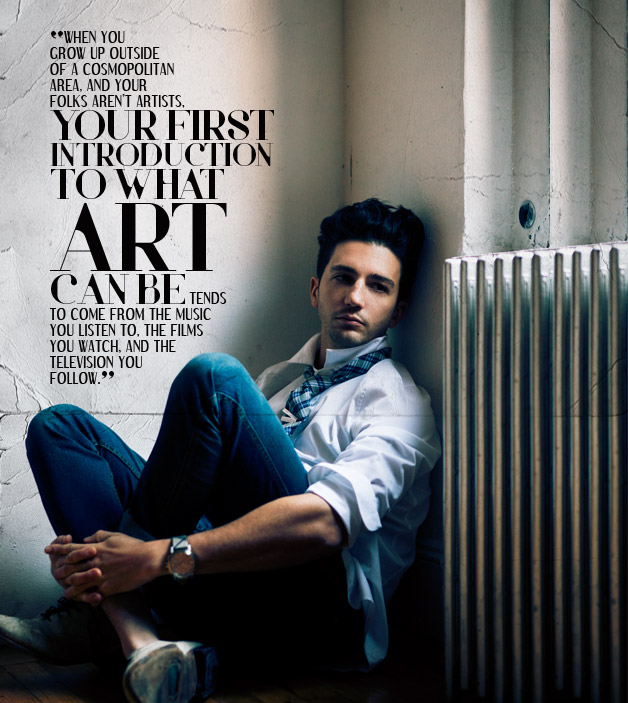
Wearing the evolution of his era as a crest, Douglas and gang reside in the grey area of period change. Generations collide when Douglas returns home after his father is diagnosed with cancer. Scenes between Gandolfini and Magaro are a highlight of Not Fade Away, and a platform for Magaro’s breakthrough performance in the film. Defined by intelligence and thoughtfulness Magaro’s Douglas is evidence enough of why he was included amongst this year’s “Hollywood Spotlight Awards” lineup alongside other bright young talents including Ezra Miller, Samantha Barks and Not Fade Away co-star Bella Heathcote. In the role of the sentimental hangdog, the audience can’t help but sympathize with Magaro’s as he struggles between moving forward down his own path, and understanding the home and parents from where he came.
A hit at the New York Film Festival this fall, Not Fade Away is now playing in theatres. Below, Magaro talks to FILLER about the importance of music to the youth of the 60s and to the story of his character, Douglas.

How was it working with David Chase?
I have been an admirer of David’s work since I was a teen. For me, religiously following a television series has always been a chore, but the Sopranos changed that. Every Sunday night when I would sit down and watch the Sopranos, I would be sucked into the stories David was telling. I had never seen real people brought to life on the small screen the way David did with that show. He writes layered, complex, and most importantly honest characters which, as an actor, are parts you would kill to play. So having the chance to work so closely with him and learn from him was a blessing.
What about as a first time feature film director, did he pretty much have it down pat?
He is a veteran and an auteur. And although it was his first time directing a feature, it never felt that way. He knows what he wants. He knows what is good. He knows what is shit. And he gets the best out of his actors and crew.
Music was like another character in The Sopranos; with Not Fade Away’s music based subject matter, I imagine that’s even more so the case, no?
I would agree with that. Then again, I didn’t work on The Sopranos… I was merely a fan, so it’s hard for me to say how important music was for that series. Clearly every episode had a great soundtrack, but ultimately it was about the family. Not Fade Away is about music and its effect on these characters’ lives. So I would definitely feel comfortable saying that music is a much greater character in our film than it ever was in The Sopranos.
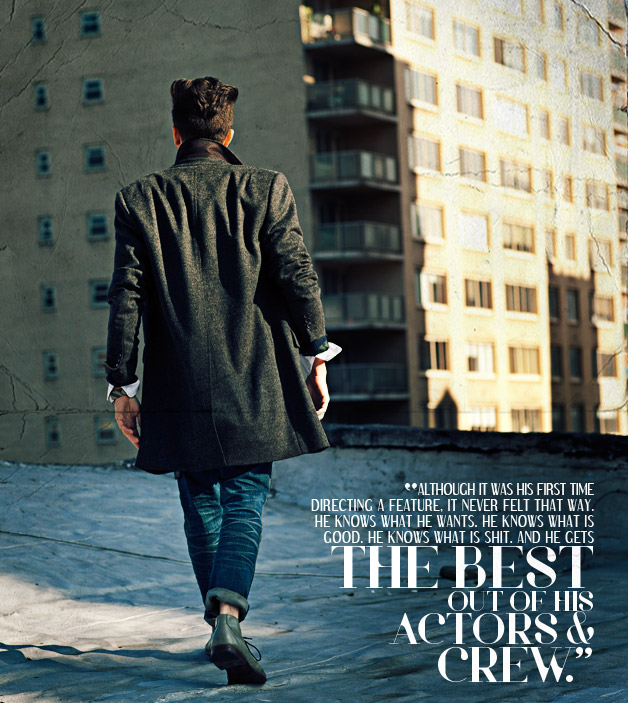
The soundtrack is pretty phenomenal, especially love the original track, “St. Valentine’s Day Massacre,” written by Steven Van Zandt for your character’s band. How do you think Douglas would describe the significance of music?
I mean music is Douglas’ in into an artistic life. David has even said this about his own experiences, and I imagine a lot of kids who grew up in the suburbs feel the same way. For Douglas, when he sees The Stones on TV and realizes “this is art!,” it opens him up to an entirely new world.
There are a few of these moments of realization triggered by music throughout the film for Douglas. Did you listen to a lot of music from the 60s in your preparation for the role, and did you find any favourites in the process?
The short answer is yes! I have always listened to a lot of 60s music. In fact, that and early rock and roll is all I listen to. Maybe I need to expand my taste, but I keep finding myself coming back to that era. There was so much going on in music at that time, the songs are filled with such life, and each time I listen to them I find something new. That makes it timeless. While shooting the film I began listening to a lot of blues musicians who ultimately influenced the artists in the 60s. I came away from it loving Elmore James.
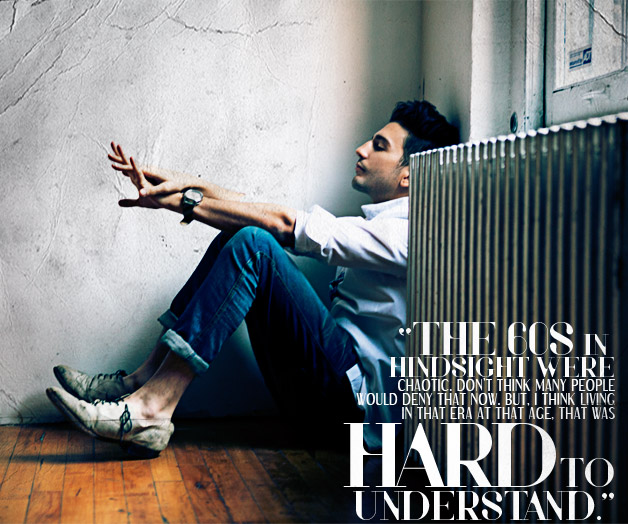
It’s an interesting period in music history, one that really captured the social climate of the day, which Not Fade Away demonstrates. Where does Douglas fall into the changing of the times?
The 60s in hindsight were chaotic. I don’t think many people would deny that now. But, I think living in that era, at that age, that was hard to understand. People, especially young people, tend to focus on themselves. Their own struggles often trump the real issues of the world outside. Not to say he is unaware of what is going on around him, but whether Douglas is living in 2012 or 1963, he is still a kid trying to find an identity, and that is a real pain in the ass sometimes.
Well put! Do you imagine you would have been similar at all to Douglas — a little rebellious — had you grown up in the 60s?
I didn’t grow up in the 60s, still those years for me feel eerily similar to Douglas’ experiences. The struggle to figure out who you are; the anger, frustration, depression, anxiety, jealousy all was very close to the surface. All the while you have a dream for how you want your life to be, but [have] no clear idea of how to make that happen.
I remember that feeling, it leaves a person anxious to find an outlet.
I think that led me to be somewhat rebellious — not out of wanting to be, but out of not knowing what the hell else to do. If you are lucky in that craziness, you may find a few moments of clarity.
Published December 22, 2012







